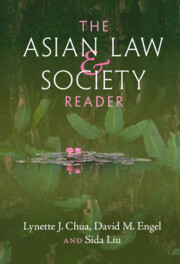Book contents
- Reviews
- The Asian Law and Society Reader
- The Asian Law and Society Reader
- Copyright page
- Dedication
- Contents
- Detailed Table of Contents
- Acknowledgments
- Publisher’s Acknowledgments
- Introduction
- 1 Religion
- 2 Legal Pluralism
- 3 Disputing
- 4 Legal Consciousness
- 5 Legal Mobilization
- 6 Legal Professions
- 7 Courts
- 8 Crime and Justice
- 9 Practicing Law and Society Scholarship in Asia
- Index
- References
5 - Legal Mobilization
Published online by Cambridge University Press: 02 March 2023
- Reviews
- The Asian Law and Society Reader
- The Asian Law and Society Reader
- Copyright page
- Dedication
- Contents
- Detailed Table of Contents
- Acknowledgments
- Publisher’s Acknowledgments
- Introduction
- 1 Religion
- 2 Legal Pluralism
- 3 Disputing
- 4 Legal Consciousness
- 5 Legal Mobilization
- 6 Legal Professions
- 7 Courts
- 8 Crime and Justice
- 9 Practicing Law and Society Scholarship in Asia
- Index
- References
Summary
Legal mobilization refers to the use of law to express claims and desires in order to achieve change or protect interests. It can be carried out by individuals or by a collective of people. Importantly, legal mobilization encompasses more than going to court to litigate disputes, an action that may prove ineffective or even irrelevant in some Asian contexts. In addition to litigation, legal mobilization occurs in other ways, even when an individual or group merely articulates a problem to a confidante in terms of rights or other legal concepts. In Asia, this broader concept of legal mobilization is especially apropos, since so much “legal” activity—broadly construed—takes place far from the justice institutions the state has established. In this chapter, the readings illustrate the range of tactics used by those who mobilize the law to achieve their goals. They also illustrate both the risks and rewards associated with the invocation of legal rights in Asian societies. As the authors make clear, rights can have paradoxical effects, and can simultaneously empower and disempower or stigmatize those who use them. In some instances, however, the results are hugely beneficial to those who felt hopeless in the absence of legal protection.
- Type
- Chapter
- Information
- The Asian Law and Society Reader , pp. 183 - 226Publisher: Cambridge University PressPrint publication year: 2023

